Coworker.ai Raises $13M to Transform Enterprise Workflows with AI Teammates
July 10, 2025
byFenoms Startup Research

Coworker.ai, an emerging force in enterprise AI, has successfully raised $13 million in seed funding to reimagine how businesses interact with software - by embedding AI-native coworkers directly into their teams. The round includes participation from Jeff Huber, Ramtin N., Mallun Yen, Timothy Young, Jack Greenfield, Soma Capital, Focal VC, Mischief, and Karman Ventures.
Founded by Alex Calder and Bradford Church, Coworker.ai is building what they call “a new kind of software employee” - fully autonomous, AI-powered agents that help human teams achieve more by handling complex digital workflows, project ownership, and decision logic.
Why Execution-First AI Is Becoming the Real Moat
Founders chasing AI integration often focus too much on outputs and not enough on ownership. But true transformation happens when AI doesn’t just recommend a course of action - it takes responsibility for seeing it through.
That’s where Coworker.ai is quietly building a defensibility moat. Their agents aren’t just trained on APIs - they’re trained on organizational nuance: how your teams work, how decisions are made, what failure looks like. This gives Coworker.ai an edge no generic LLM wrapper can match. The deeper the agent embeds, the harder it is to rip out - and the more indispensable it becomes.
Here’s the founder insight that matters: AI’s real unlock for enterprises isn’t speed - it’s continuity. The ability for software to remember yesterday’s context, interpret today’s change, and proactively act tomorrow - without being prompted. That’s how Coworker.ai is future-proofing its role inside the org chart.
From Software as a Tool to Software as a Teammate
The company’s vision is rooted in a simple shift: AI should not just support workflows - it should own them. Traditional software helps execute tasks. Coworker.ai builds autonomous systems that collaborate, decide, and act, much like a human colleague.
This is not another chatbot or dashboard. Coworker.ai’s platform connects deeply into internal business systems, learns organizational logic, and deploys “AI coworkers” that function like team members - attending standups, delivering reports, suggesting strategy changes, and managing digital tasks end-to-end.
With the new funding, Coworker.ai aims to further refine its agent-based architecture, integrate with more enterprise tools (Slack, Notion, Jira, Salesforce), and expand deployment across marketing, sales ops, HR, and engineering departments.
A Shift in How Work Gets Done
Here’s what’s changing: Enterprises no longer want dashboards - they want decisions. As AI agents mature, the bottleneck moves from access to action. Coworker.ai recognizes this inflection and is building agents that don’t just answer questions - they complete work.
What makes this powerful for enterprise teams is their ability to delegate outcomes. Teams using Coworker.ai no longer have to micromanage task chains; instead, they assign goals, and the AI agent builds, tracks, and iterates autonomously.
This leap toward “autonomous execution” changes the DNA of enterprise software. It’s not about UI anymore - it’s about ROI.
Market Outlook: Why the AI Coworker Model Is Booming
The rise of AI-native software is more than a trend - it's a strategic response to growing enterprise complexity. According to Gartner, by 2026, over 75% of enterprises will adopt AI agents to handle repetitive knowledge work. This shift is already being reflected in spending: IDC estimates the enterprise AI software market will exceed $278 billion by 2027, growing at a CAGR of 33.2%.
Another critical factor is talent scalability. McKinsey research shows that enterprises using AI-based task delegation report up to 30% time savings in project delivery cycles and 45% higher accuracy in cross-functional task execution.
These trends position Coworker.ai to thrive, especially as businesses seek hybrid-compatible, 24/7 execution partners that aren’t limited by bandwidth, fatigue, or context switching.
Founders’ Advantage: Systems That Learn Organizational Logic
Here’s where many founders miss the opportunity: they build general-purpose agents trained on public data and generic tasks. But true defensibility comes from embedding your AI into the internal logic of an organization.
Coworker.ai doesn’t just ingest workflows - it learns them. Over time, its agents develop contextual fluency, adapt to culture-specific norms, and handle exceptions like seasoned employees. That makes handoffs smoother, compliance tighter, and impact more measurable.
This is what turns Coworker.ai into more than just another AI layer. It becomes part of your team’s institutional memory.
What’s Next for Coworker.ai
With this $13 million injection, Coworker.ai plans to:
- Expand its engineering and agent training teams
- Launch industry-specific modules for finance, logistics, and SaaS
- Deepen integrations across enterprise platforms and data lakes
- Continue refining governance layers to ensure transparency and trust
The company is also actively engaging with beta partners to deploy agents in live business environments - measuring both productivity outcomes and organizational transformation.
The Broader Implication: Software That Thinks Like Us
Coworker.ai represents a broader shift in how businesses think about work. We’re moving past automation as a productivity hack and entering an era where autonomous digital teammates become part of the workforce.
It’s a paradigm where productivity is not about scaling people - it’s about scaling intelligence. And with leaders like Calder and Church steering the mission, Coworker.ai is poised to become a defining player in the AI-native enterprise stack.









